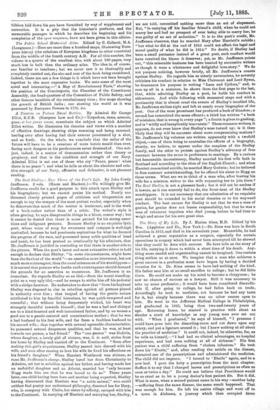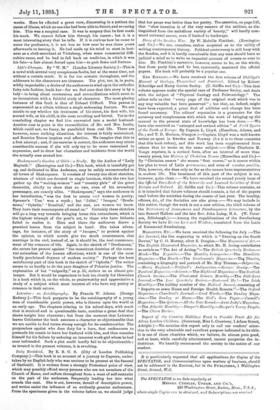The Story of My Life. By J. Marion Sims, M.D.
Edited by his Son. (Appleton and Co., New York.)—Dr. Sims was born in South Carolina in 1813, and died in his seventieth year. Meanwhile, he had achieved a great reputation as a surgeon, especially for certain operations in surgery which had never been attempted till he showed that they could be done with success. He here tells us the story of his life, carrying it down to within a short time of his death. Any. thing more candid and unpretending cannot be imagined. One curious thing strikes us at once. We imagine that a man who achieves a great success in a profession must have begun by having a decided vocation for it. Dr. Sims seems to have had nothing of the kind. His father sent him at no small sacrifice to college; but he did little there. He could not make up his mind to become a clergyman ; he saw no chance of success as a lawyer. Still it was necessary to take up some profession ; it would have been considered discredit- able if, after going to college, he had fallen back on trade. Accordingly he took to medicine, not because he had any taste for it, but simply because there was no other course open to him. He went to the Jefferson Medical College in Philadelphia, and graduated in 1835, being then two-and-twenty years of age. Returning home, he started in practice with about as slender a stock of knowledge as any young man ever set out with. "When I graduated," he says of himself, "I presume I could have gone into the dissecting-room and cut down upon any artery, and put a ligature around it ; but I knew nothing at all about the practice of medicine." It could not, indeed, be otherwise, for, as he tells us himself,—" I had had no clinical advantages, no hospital experience, and had seen nothing at all of sickness." His first patient was a child suffering from "cholera infantum." He took down his "Eberle," and, after reading the article on the disease, extracted one of the prescriptions and administered the medicine. The child did not improve. "I turned to 'Eberle' again, and to a new leaf. I gave the baby a prescription from the next chapter. Suffice it to say that I changed leaves and prescriptions as often as once or twice a day." He could not believe that Providence would be so cruel as to let a young doctor's first patient die. Bat it did. What is more, when a second patient came in his way—another baby —suffering from the same disease, the same result happened. That was enough for him. He left his native village and went off to a town in Alabama, a journey which then occupied three



































 Previous page
Previous page